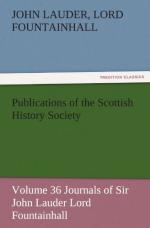[23] Sir George Mackenzie
also, who criticises Lauderdale’s proceedings
very
freely, pays a fine tribute to one trait in his character,
’Lauderdale
who knew not what it was to dissemble.’—Memoirs,
p.
182.
[Sidenote: H.O. 166]
[Sidenote: H.0. 196.]
[Sidenote: H.O. 189.]
Although Lauder considered that Argyll had been unjustly condemned in the matter of the Test, his opinion about the expedition of 1685 was very different. He did justice to his capacity. He writes, ’Argile had always the reputation of sense and reason, and if the Whigs at Bothwell Bridge in 1679 had got such a commander as he, it’s like the rebellion had been more durable and sanguinarie’ But as soon as the news of Argyll’s landing on the west coast came, this is his note, ’Argile, minding the former animosities and discontents in the country, thought to have found us all alike combustible tinder, that he had no more adoe then to hold the match to us, and we would all blow up in a rebellion; but the tymes are altered, and the peeple are scalded so severely with the former insurrections, that they are frighted to adventure on a new on. The Privy Council, though they despised this invasion, yet by proclamations they called furth the whole heritors of Scotland,’ and so on. ’Some look on this invasion as a small matter, but beside the expence and trouble it hes put the country to, if we ponder the fatall consequences of such commotions, we’ll change our opinions: for when the ramparts of government are once broke down, and the deluge follows, men have no assurances that the water will take a flowing towards their meadows to fructify them; no, no, just in the contrare.’ Argyll was discovered and apprehended in his flight by a weaver near Paisley, of whom Lauder says, ’I think the Webster who took him should be rewarded with a litle heritage (in such a place wher Argile’s death will not be resented), and his chartre should bear the cause, and he should get a coat of arms as a gentleman, to incouradge others heirafter.’ It does not appear that this suggestion was acted upon.




